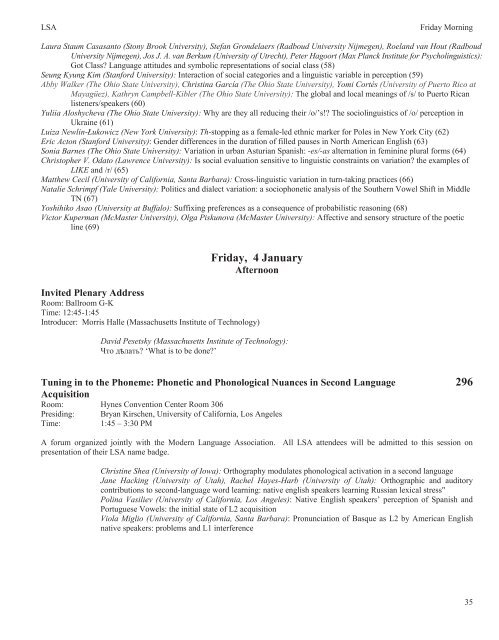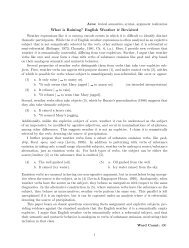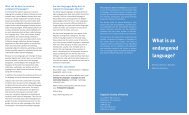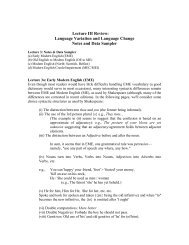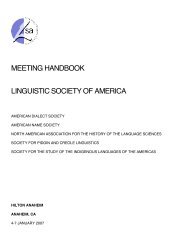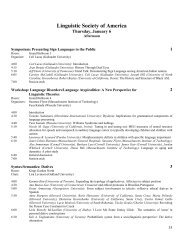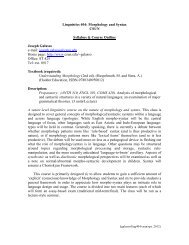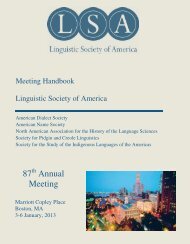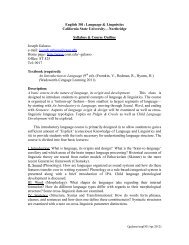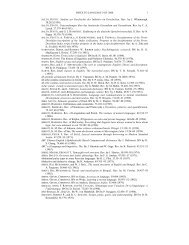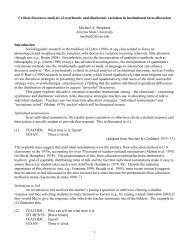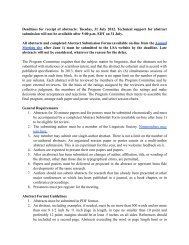here - Linguistic Society of America
here - Linguistic Society of America
here - Linguistic Society of America
You also want an ePaper? Increase the reach of your titles
YUMPU automatically turns print PDFs into web optimized ePapers that Google loves.
LSAFriday MorningLaura Staum Casasanto (Stony Brook University), Stefan Grondelaers (Radboud University Nijmegen), Roeland van Hout (RadboudUniversity Nijmegen), Jos J. A. van Berkum (University <strong>of</strong> Utrecht), Peter Hagoort (Max Planck Institute for Psycholinguistics):Got Class? Language attitudes and symbolic representations <strong>of</strong> social class (58)Seung Kyung Kim (Stanford University): Interaction <strong>of</strong> social categories and a linguistic variable in perception (59)Abby Walker (The Ohio State University), Christina García (The Ohio State University), Yomi Cortés (University <strong>of</strong> Puerto Rico atMayagüez), Kathryn Campbell-Kibler (The Ohio State University): The global and local meanings <strong>of</strong> /s/ to Puerto Ricanlisteners/speakers (60)Yuliia Aloshycheva (The Ohio State University): Why are they all reducing their /o/’s!? The sociolinguistics <strong>of</strong> /o/ perception inUkraine (61)Luiza Newlin-Łukowicz (New York University): Th-stopping as a female-led ethnic marker for Poles in New York City (62)Eric Acton (Stanford University): Gender differences in the duration <strong>of</strong> filled pauses in North <strong>America</strong>n English (63)Sonia Barnes (The Ohio State University): Variation in urban Asturian Spanish: -es/-as alternation in feminine plural forms (64)Christopher V. Odato (Lawrence University): Is social evaluation sensitive to linguistic constraints on variation? the examples <strong>of</strong>LIKE and /r/ (65)Matthew Cecil (University <strong>of</strong> California, Santa Barbara): Cross-linguistic variation in turn-taking practices (66)Natalie Schrimpf (Yale University): Politics and dialect variation: a sociophonetic analysis <strong>of</strong> the Southern Vowel Shift in MiddleTN (67)Yoshihiko Asao (University at Buffalo): Suffixing preferences as a consequence <strong>of</strong> probabilistic reasoning (68)Victor Kuperman (McMaster University), Olga Piskunova (McMaster University): Affective and sensory structure <strong>of</strong> the poeticline (69)Friday, 4 JanuaryAfternoonInvited Plenary AddressRoom: Ballroom G-KTime: 12:45-1:45Introducer: Morris Halle (Massachusetts Institute <strong>of</strong> Technology)David Pesetsky (Massachusetts Institute <strong>of</strong> Technology):Что дѣлать? ‘What is to be done?’Tuning in to the Phoneme: Phonetic and Phonological Nuances in Second Language 296AcquisitionRoom: Hynes Convention Center Room 306Presiding: Bryan Kirschen, University <strong>of</strong> California, Los AngelesTime: 1:45 – 3:30 PMA forum organized jointly with the Modern Language Association.presentation <strong>of</strong> their LSA name badge.All LSA attendees will be admitted to this session onChristine Shea (University <strong>of</strong> Iowa): Orthography modulates phonological activation in a second languageJane Hacking (University <strong>of</strong> Utah), Rachel Hayes-Harb (University <strong>of</strong> Utah): Orthographic and auditorycontributions to second-language word learning: native english speakers learning Russian lexical stress"Polina Vasiliev (University <strong>of</strong> California, Los Angeles): Native English speakers’ perception <strong>of</strong> Spanish andPortuguese Vowels: the initial state <strong>of</strong> L2 acquisitionViola Miglio (University <strong>of</strong> California, Santa Barbara): Pronunciation <strong>of</strong> Basque as L2 by <strong>America</strong>n Englishnative speakers: problems and L1 interference35


